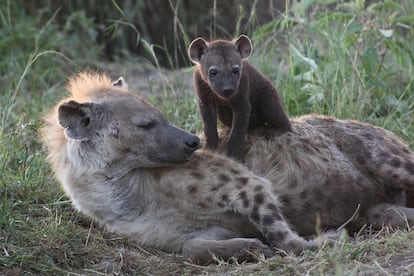For spotted hyenas, a mother’s social status determines length and quality of life
The strongest females pass on their privileged associations to their offspring, providing them with priority access to food and a greater support network in times of conflict

Inheriting social status is not an unusual thing in nature, certainly not in humans. It is also frequent for offspring to inherit the social relationships of their parents. This has been observed in African elephants and in macaques, and now also in spotted hyenas, whose social structures are very similar to those of macaques.
A new study published in the journal Science analyzed 73,767 social interactions among wild spotted hyenas collected over 27 years and reached the following conclusion: juvenile hyenas had social associations that were similar to their mothers, and the strength of the association was higher for higher-status mothers. This phenomenon has important implications for hyena survival.
Spotted hyenas are an example of a matriarchal system among mammals: females are in charge and males leave to seek out new packs. According to the study, even years after leaving the lair, higher-status hyenas retain strong relationships with the same individuals that their mothers associated with, even after the mothers die.
Lower-status hyenas, on the other hand, tend to seek out numerous different relationships in a bid to compensate for their greater vulnerability. This has two clear consequences: the group remains stable for decades (spotted hyenas can live up to 25 years) with the same families in charge, and higher-status hyenas can expect to live longer.
Kay E. Holekamp, a researcher from Michigan State University and co-author of the study, believes that their work illustrates how something as complex as cultural inheritance, which we observe in humans, can be seen through the inheritance of social status in spotted hyenas. “Besides the physical manifestations of wealth or poverty, we know that humans pass on much less tangible things such as language, complete sets of cultural norms, beliefs and groups of relationships with other members of our societies,” she says.
The group remains stable for decades (spotted hyenas can live up to 25 years) with the same families in charge, and higher-status hyenas can expect to live longer
Spotted hyenas provide their young with similar advantages, even though these are less sophisticated than in humans. Being friends with higher-status hyenas means priority access to food and avoiding the stress of fighting for the leftovers in packs of as many as 130 members. It also means having more allies at times of conflict.
Three years ago, specialists at the Leibniz Institute for Zoo and Wildlife Research showed in a study how alliances reinforce hyena matriarchy. Just like with female bonobos, female spotted hyenas get to keep the throne not because they are stronger than the males (although they are slightly larger than them) but because of the alliances they build to deal with attacks.
One of the authors of that study, Eve Davidian, says their work proved that the amount of relatives an individual can rely on, and the asymmetries between individuals, are strong predictors of the dominance relationship between two hyenas. “But it wasn’t clear how those asymmetries emerged; this study provides explanations,” she adds.
For young hyenas, having allies can significantly determine the outcome of a dispute, explains Holekamp. “Young individuals from higher-status lineage have more support because they have more relatives and because they also attract what we might call groupies, lower-status females who like to spend time with dominating females.”
“We already knew that in hyena societies, social status has important effects on adaptability and that it is inherited through learning. That is to say, it is not determined by physical strength or other traits that can be genetically transmitted,” says Holekamp, who has been studying hyenas in Africa for three decades.
The study shows that besides social status, entire sets of relationships are passed on from mothers to offspring, especially among high-ranking individuals. “That is also true of humans,” notes the zoologist.
English version by Susana Urra.
Tu suscripción se está usando en otro dispositivo
¿Quieres añadir otro usuario a tu suscripción?
Si continúas leyendo en este dispositivo, no se podrá leer en el otro.
FlechaTu suscripción se está usando en otro dispositivo y solo puedes acceder a EL PAÍS desde un dispositivo a la vez.
Si quieres compartir tu cuenta, cambia tu suscripción a la modalidad Premium, así podrás añadir otro usuario. Cada uno accederá con su propia cuenta de email, lo que os permitirá personalizar vuestra experiencia en EL PAÍS.
¿Tienes una suscripción de empresa? Accede aquí para contratar más cuentas.
En el caso de no saber quién está usando tu cuenta, te recomendamos cambiar tu contraseña aquí.
Si decides continuar compartiendo tu cuenta, este mensaje se mostrará en tu dispositivo y en el de la otra persona que está usando tu cuenta de forma indefinida, afectando a tu experiencia de lectura. Puedes consultar aquí los términos y condiciones de la suscripción digital.









































